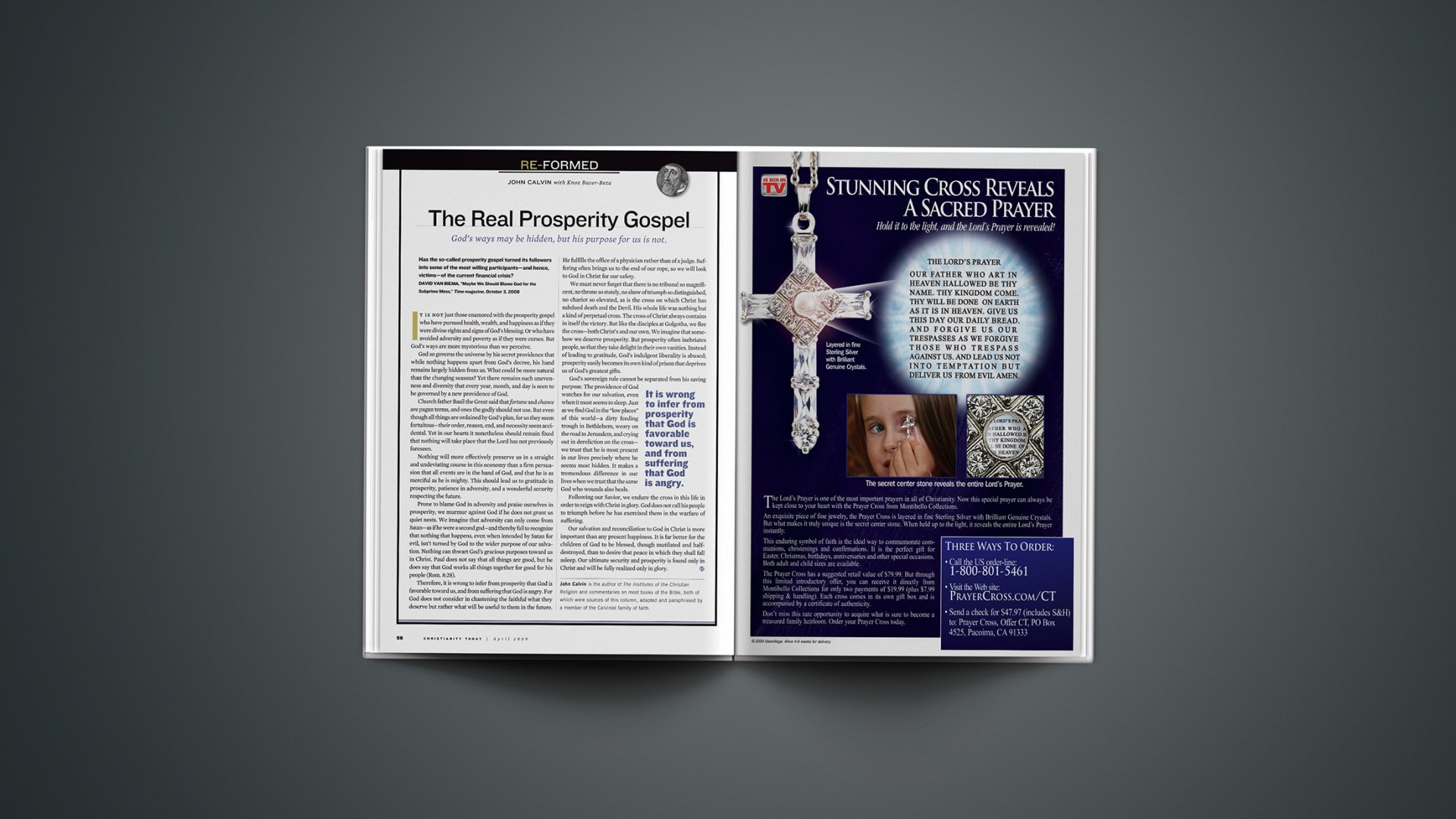Has the so-called prosperity gospel turned its followers into some of the most willing participants—and hence, victims—of the current financial crisis?
David Van Biema, “Maybe We Should Blame God for the Subprime Mess,” Time magazine, October 3, 2008
It is not just those enamored with the prosperity gospel who have pursued health, wealth, and happiness as if they were divine rights and signs of God’s blessing. Or who have avoided adversity and poverty as if they were curses. But God’s ways are more mysterious than we perceive.
God so governs the universe by his secret providence that while nothing happens apart from God’s decree, his hand remains largely hidden from us. What could be more natural than the changing seasons? Yet there remains such unevenness and diversity that every year, month, and day is seen to be governed by a new providence of God.
Church father Basil the Great said that fortune and chance are pagan terms, and ones the godly should not use. But even though all things are ordained by God’s plan, for us they seem fortuitous—their order, reason, end, and necessity seem accidental. Yet in our hearts it nonetheless should remain fixed that nothing will take place that the Lord has not previously foreseen.
Nothing will more effectively preserve us in a straight and undeviating course in this economy than a firm persuasion that all events are in the hand of God, and that he is as merciful as he is mighty. This should lead us to gratitude in prosperity, patience in adversity, and a wonderful security respecting the future.
Prone to blame God in adversity and praise ourselves in prosperity, we murmur against God if he does not grant us quiet nests. We imagine that adversity can only come from Satan—as if he were a second god—and thereby fail to recognize that nothing that happens, even when intended by Satan for evil, isn’t turned by God to the wider purpose of our salvation. Nothing can thwart God’s gracious purposes toward us in Christ. Paul does not say that all things are good, but he does say that God works all things together for good for his people (Rom. 8:28).
Therefore, it is wrong to infer from prosperity that God is favorable toward us, and from suffering that God is angry. For God does not consider in chastening the faithful what they deserve but rather what will be useful to them in the future. He fulfills the office of a physician rather than of a judge. Suffering often brings us to the end of our rope, so we will look to God in Christ for our safety.
We must never forget that there is no tribunal so magnificent, no throne so stately, no show of triumph so distinguished, no chariot so elevated, as is the cross on which Christ has subdued death and the Devil. His whole life was nothing but a kind of perpetual cross. The cross of Christ always contains in itself the victory. But like the disciples at Golgotha, we flee the cross—both Christ’s and our own. We imagine that somehow we deserve prosperity. But prosperity often inebriates people, so that they take delight in their own vanities. Instead of leading to gratitude, God’s indulgent liberality is abused; prosperity easily becomes its own kind of prison that deprives us of God’s greatest gifts.
God’s sovereign rule cannot be separated from his saving purpose. The providence of God watches for our salvation, even when it most seems to sleep. Just as we find God in the “low places” of this world—a dirty feeding trough in Bethlehem, weary on the road to Jerusalem, and crying out in dereliction on the cross—we trust that he is most present in our lives precisely where he seems most hidden. It makes a tremendous difference in our lives when we trust that the same God who wounds also heals.
Following our Savior, we endure the cross in this life in order to reign with Christ in glory. God does not call his people to triumph before he has exercised them in the warfare of suffering.
Our salvation and reconciliation to God in Christ is more important than any present happiness. It is far better for the children of God to be blessed, though mutilated and half-destroyed, than to desire that peace in which they shall fall asleep. Our ultimate security and prosperity is found only in Christ and will be fully realized only in glory.
John Calvin is the author of The Institutes of the Christian Religion and commentaries on most books of the Bible, both of which were sources of this column, adapted and paraphrased by a member of the Calvinist family of faith.
Copyright © 2009 Christianity Today. Click for reprint information.
Related Elsewhere:
John Calvin’s first column debated earlier this year:
Reverence for the Mystery | God does not have to answer to us for his ways. (February 2009)
Christianity Today has more opinion articles.










